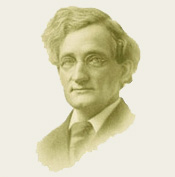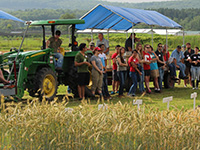Introduction | Participate | Understand | Monitor | Adapt | Mitigate | Activities | Case Studies | Links | Downloadable PDF
During the summer of 2008, two different youth groups decided to pilot the “One Seed at a Time” model by incorporating the theme of climate change into their summer programming. Their goal was to demonstrate how teams of children, youth and adults can work in partnership to combat climate change in their communities through sustainable gardening practices and other related activities. Through this pilot project, a framework was developed for “One Seed at a Time” activities:
(1) Understanding: Youth learned about the causes and impacts of climate change both on the broader global environment and on local gardens specifically.
(2) Monitoring: Youth became citizen scientists and monitored the climate-induced changes in their garden and natural landscape.
(3) Adapting: Youth tried out different approaches to adapting a garden to a changing climate.
(4) Mitigating: Youth created “greener” gardens and adopted other sustainable lifestyle practices that are part of the climate change solution.
Pilot Sites:
Pilot Site #1 – CITY Project in Binghamton, NY
Pilot Site #2 – Berne-Knox-Westerlo School Garden Project in Berne,NY
Pilot Site #1 – CITY Project in Binghamton,NY
The CITY Project In Binghamton, NY uses Youth Community Action (YCA) as an intentional process to promote civic engagement, workforce preparation, and asset development among youth (14-18 years old). The CITY Project summer program ran from July 7th to August 24th, 2008. During the summer, they took on a variety of activities related to climate change:
- They educated their peers and local community about climate change and focused their public education outreach at the local Farmer’s Market.
- The youth spent some time helping to restore the community garden at Columbus Park East in Binghamton, using organic gardening practices.
- At the NYS Fair, those who worked in the Press Corps interviewed fairgoers about their opinions on climate change, while others manned the CITY Project’s educational booth about climate change.
- The NYS fairgoers were given tips on how to help stop climate change through simply changing practices in their own gardens. For example, they could: start a food garden, buy local and organic food, compost, use a push lawn mower, plant trees, plant native species, and reduce water consumption through using rain barrels and mulching.
For more information see (pdfs):
CITY Project contacts:
-
- June P. Mead (Project Director and Evaluator, Dept. of Human Development, Cornell University)
- Vicki Giarratano (Community Project Coordinator, Cornell Cooperative Extension Broome County)
Pilot Site #2 – Berne-Knox-Westerlo School Garden Project in Berne,NY

The Berne School Garden Project ran from July 7th to August 14th, 2008. There were 3 teen leaders who supervised a group of 14 children from grades 2-5. Throughout the summer, they incorporated a variety of activities related to climate change into their regular garden program:
- They explored the topic of climate change and learned about the effects of climate change on the environment.
- They began a pen pal exchange with peers in the Arctic to learn about life in the North and how the Arctic is being affected by climate change. In turn, they shared stories about their garden and what “green” gardening practices they had started as a way to help stop global climate change.
- They learned about the role of trees in reducing carbon dioxide and as a result, raised and distributed tree seedlings to family and community members.
- They discussed adapting garden plants to a changing climate and designed plant superheroes which displayed these adaptive characteristics.
- They interviewed a Master Gardener to find out about gardening practices in the past and what age-old “green” practices we might restore today.
- They practiced sustainable gardening practices such as mulching and minimal tillage.
- They invested in a garden rain barrel to collect rainwater and reduce water use.
- They discussed carbon ‘food’ prints, the benefits of growing their own food, and created food system collages to demonstrate their knowledge of this topic.
- They learned about composting and its carbon-sequestration benefits, and began composting on site as well as created a vermi-composting bin.
- They documented this project and all of their activities through photo-journals, which they presented to the local community.
- They created signs and poster boards and actively raised awareness in their community about climate change and what one can do in their garden to help stop global warming!
For more information see (pdf): Project Plan
Berne-Knox-Westerlo School Garden contacts:
-
- Bonnie Conklin (Group Leader)
- Sue Pezolla (Albany Master Gardener)
- Mary Jane Rissacher (4-H Youth Development Coordinator)










